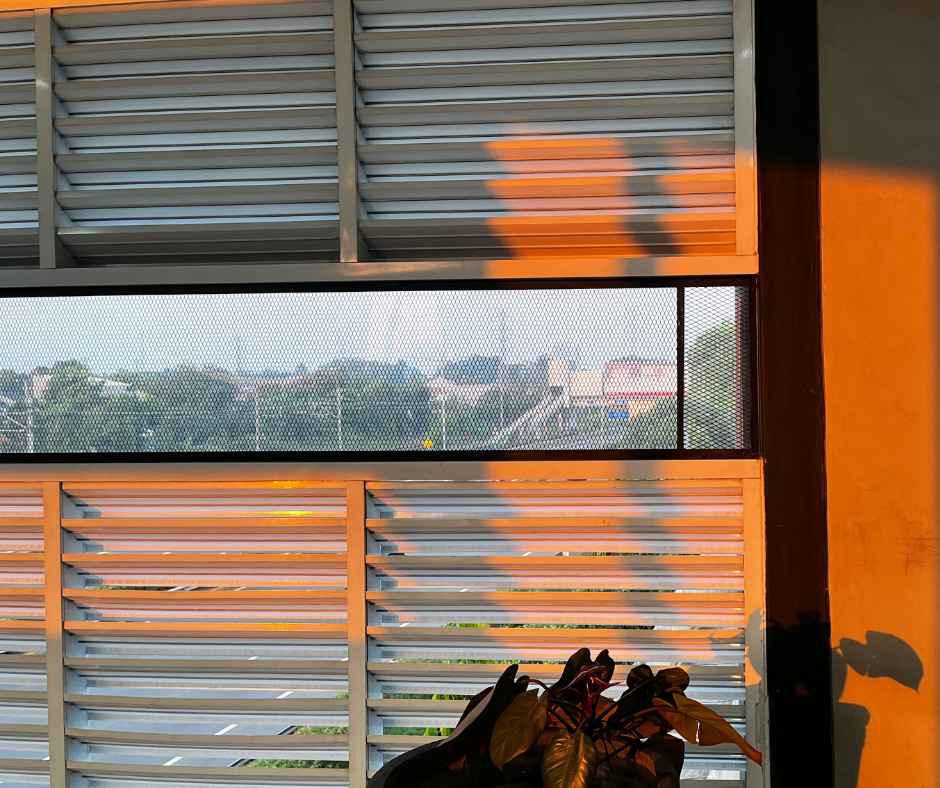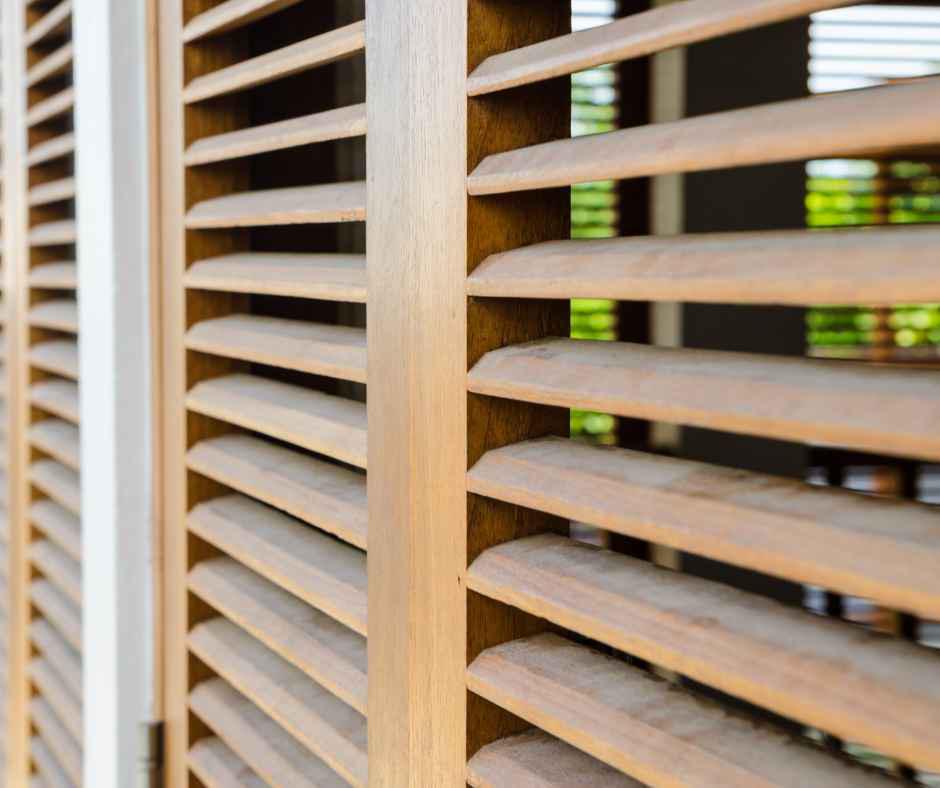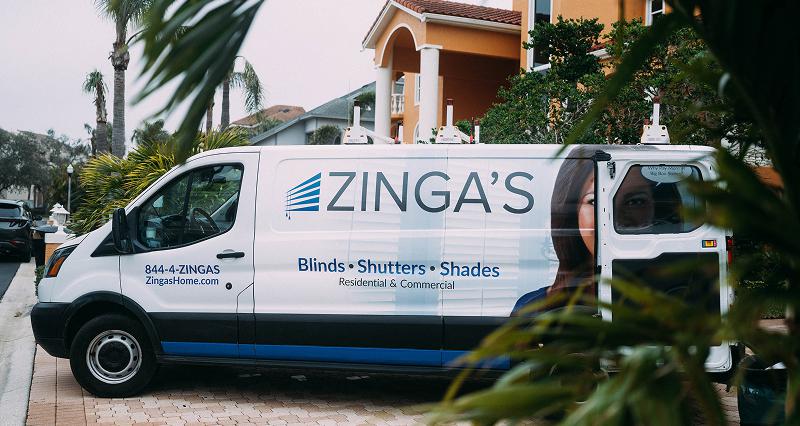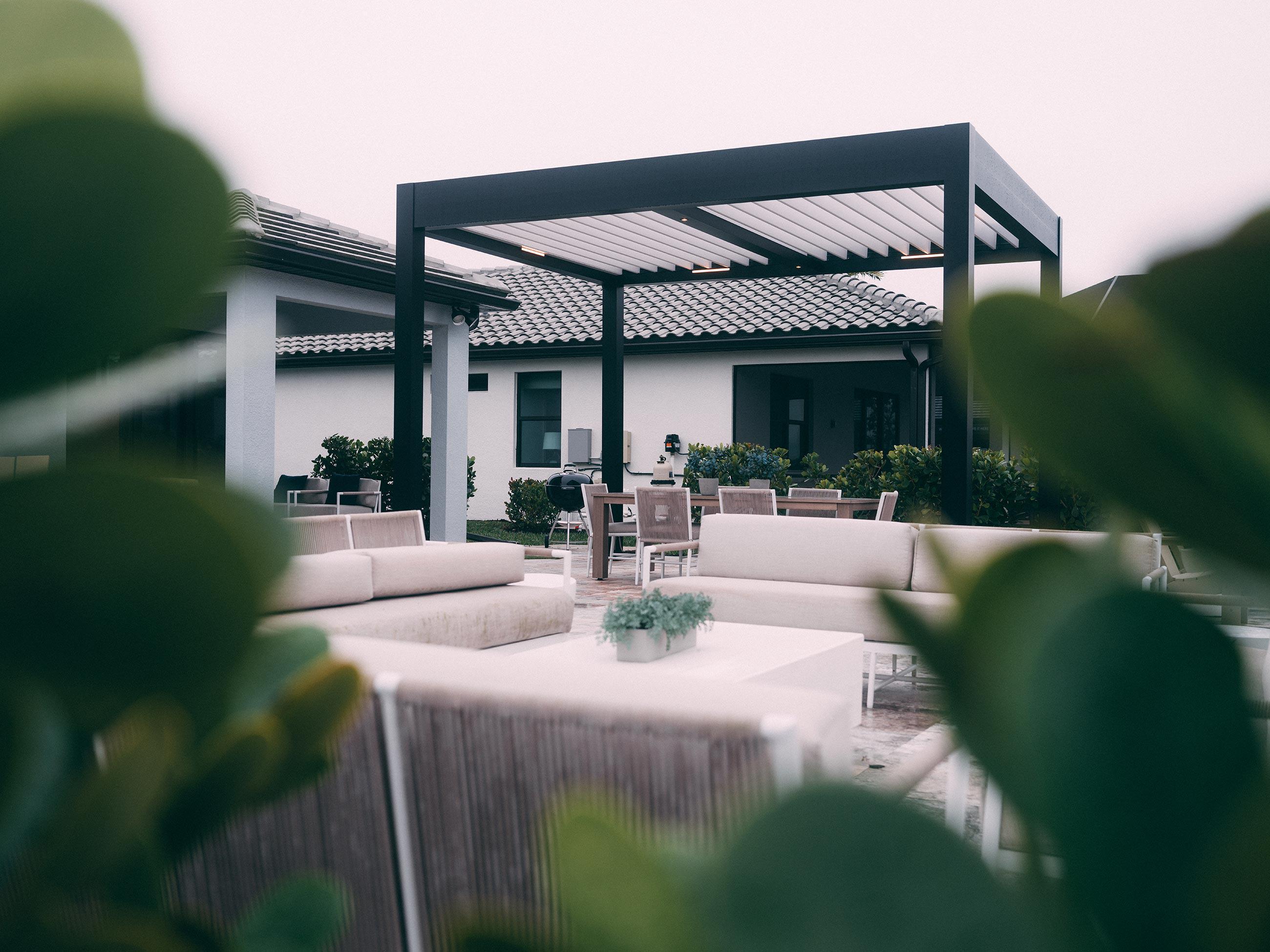Bringing the Outdoors In: The Perfect Screen Solution
Screens for sliding patio doors are essential for homeowners wanting to enjoy fresh air without unwanted insects. When looking for the right screen solution, here's what you need to know:
Types of Sliding Patio Door Screens:
1. Traditional sliding panels - Aluminum frames with mesh that slide alongside your door
2. Retractable screens - Spring-loaded systems that disappear when not in use
3. Motorized screens - Remote-controlled screens for convenience
4. Security screens - Reinforced mesh for added protection
Popular Screen Materials:
- Standard fiberglass (18×16 weave)
- Pet-resistant mesh (stronger, tear-resistant)
- No-see-um mesh (20×20 weave for tiny insects)
- Solar mesh (blocks up to 65% of UV rays)
The perfect patio door screen transforms how you experience your home, creating a seamless transition between indoor comfort and outdoor living. With the right screen, you can enjoy cool breezes on summer evenings without worrying about mosquitoes, or let fresh air circulate through your home during mild weather while keeping pets safely inside.
"Stop fighting with opening and closing your Patio Door screen and call for a custom fit door that will work perfectly every time!"
Modern screen solutions offer far more than the flimsy, hard-to-operate screens of the past. Today's options include everything from budget-friendly replacements to sophisticated retractable systems that disappear completely when not in use.
I'm George Huizinga, founder of Zinga's, and I've spent over a decade helping homeowners select and install the perfect screens for sliding patio doors that improve both functionality and aesthetics while delivering exceptional value through our comprehensive indoor-outdoor solutions.
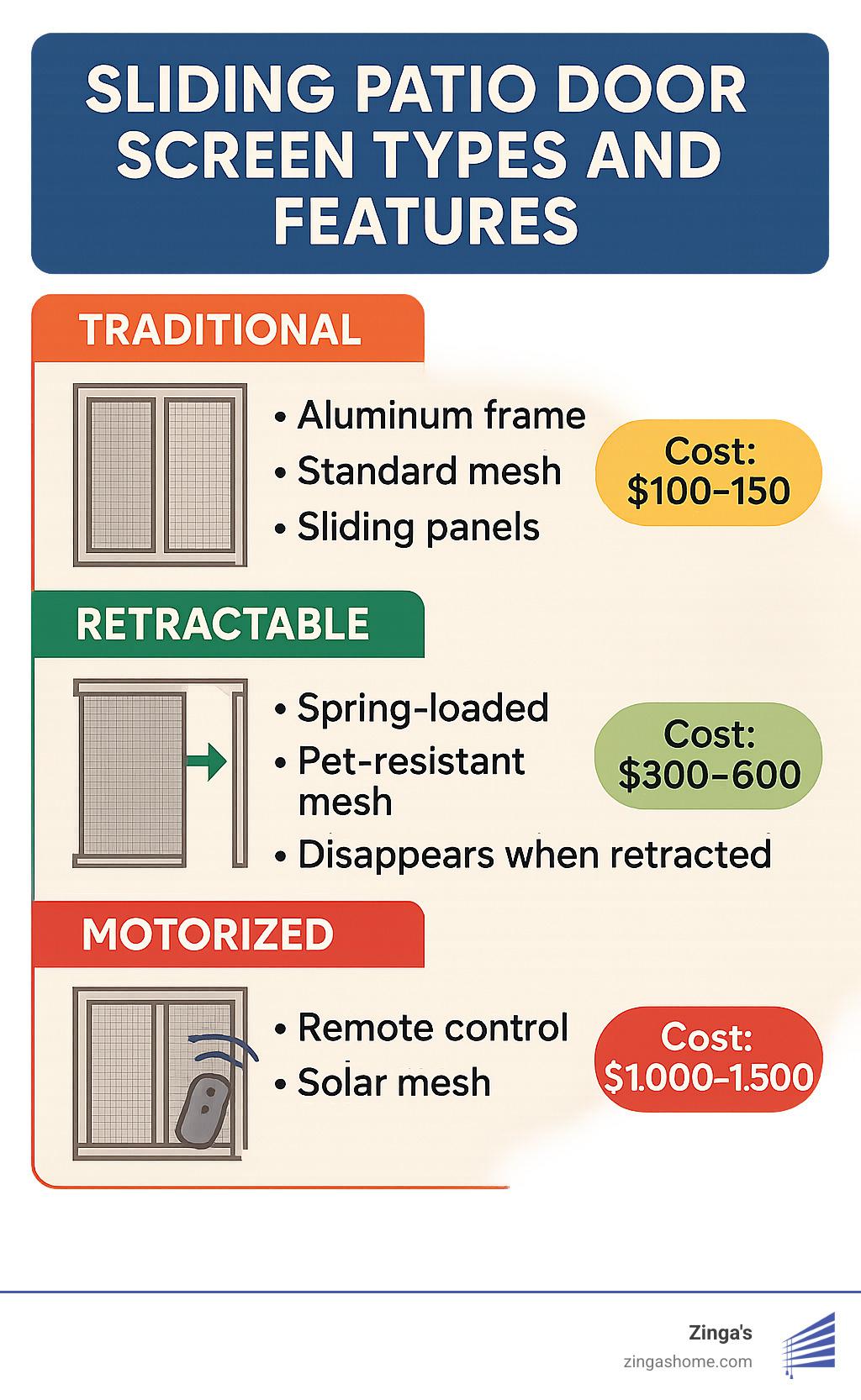
Related content about screens for sliding patio doors:
Types of Sliding Patio Door Screens
When shopping for screens for sliding patio doors, the options can feel overwhelming at first glance. Let's explore the different types to help you find the perfect match for your home, style preferences, and budget.
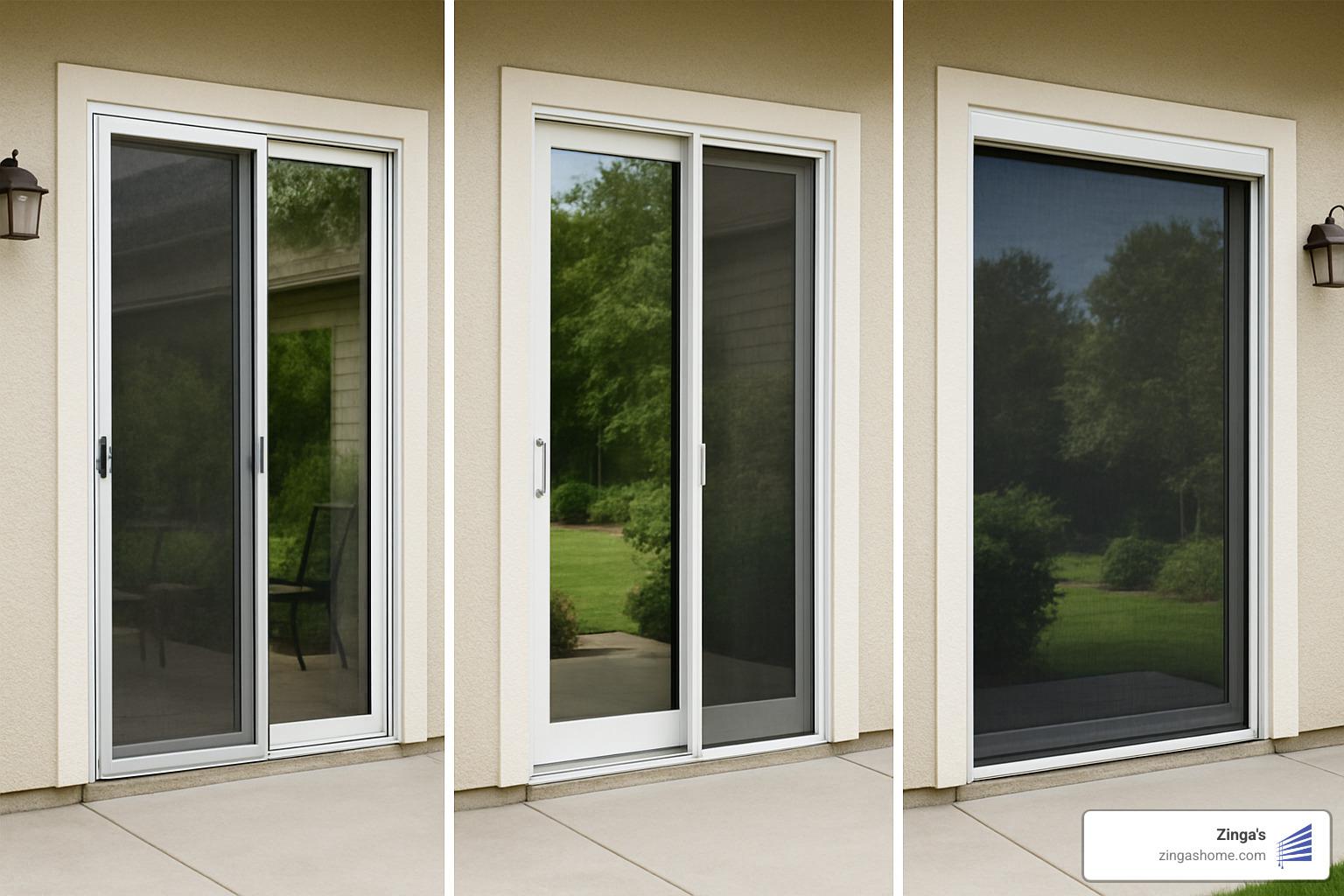
Classic Sliding Panels
The tried-and-true sliding screen door continues to be the most popular choice for homeowners across America. These screens feature sturdy extruded aluminum frames with mesh that glides smoothly alongside your glass door on a dedicated track.
What makes these classics so appealing? For starters, they're incredibly affordable, typically starting around $80 for standard sizes. They're also known for their ease of installation – many come as DIY kits that you can set up in under an hour with basic tools.
The durability factor is another big win. Those extruded aluminum frames offer significantly better strength than their roll-formed counterparts, standing up to years of daily use. Plus, they're readily available in common sizes (36×80", 48×80", 72×80") at most home improvement stores.
Steve Tristan, who recently upgraded his patio door screen, shared: "After hunting through both the Orange and Blue home improvement stores without finding the right size, I finded that custom-sized sliding screen doors were actually affordable and much higher quality than the adjustable ones."
While these traditional panels offer great value, they do remain visible even when not in use, and the tracks can collect debris over time. A quick vacuum every month keeps them sliding smoothly.
Retractable Wonders – screens for sliding patio doors
For those seeking a more neat solution, retractable screens have truly transformed the patio door experience. These clever systems stay hidden in a slim cassette mounted to your door frame when not needed, appearing only when you want fresh air.
The invisibility factor is what wins most homeowners over – these screens preserve your beautiful views and door aesthetics when not in use. Their easy operation through spring-loaded mechanisms ensures smooth deployment every time.
What makes retractables especially versatile is their compatibility with various door types including sliding, French, and pivot doors. And since they're custom sized to your exact door dimensions, the fit is always perfect.
The Brisa Retractable Screen has become a customer favorite, with installation taking about 30 minutes using just a power screwdriver. These screens feature thoughtful details like ergonomic handles with locking latches for one-handed operation and subtle woven stripes in the mesh that serve as visual cues to prevent accidentally walking through them.
A Florida customer recently told us: "My retractable screen is so discreet that visitors can't even tell it's there until they get close. It's perfect for enjoying evening breezes without disrupting our gorgeous sunset view."
While retractable screens represent a mid-range investment (typically $200-$500 depending on size and features), most come with limited lifetime warranties on hardware components, making them a sound long-term value.
Motorized & Oversize Solutions
For the ultimate in convenience or for covering expansive openings, motorized screen systems represent the pinnacle of screens for sliding patio doors. These systems shine when you have extra-large doors, dedicated outdoor entertainment areas, or simply appreciate seamless integration with your smart home.
The effortless operation via remote control, wall switch, or smart home integration makes these screens perfect for hard-to-reach areas or for those with mobility concerns. Their ability to cover wide spans up to 16 feet or more solves problems that traditional screens simply can't handle.
Many of our customers are delighted by the optional wind and sun sensors that automatically retract screens during high winds, protecting your investment. The privacy and climate control benefits are substantial too – many homeowners choose solar mesh options that provide daytime privacy while reducing heat gain.
At Zinga's, we've transformed countless homes with motorized screens for oversized sliding doors. A Nashville client recently shared: "Our motorized screens have turned our covered patio into a true three-season room. With the touch of a button, we can enjoy bug-free outdoor dining or retract them completely for an open-air experience."
While motorized screens represent a premium investment (starting around $1,000 for basic models), they add significant value to your home while dramatically enhancing your everyday living experience. For many homeowners, the convenience factor alone makes them worth every penny.
If you have a lanai or large covered outdoor area, our specialized screens can create comfortable, protected spaces that essentially extend your living area for year-round enjoyment.
Materials & Mesh: Finding the Perfect Balance
The mesh material you choose for your screens for sliding patio doors significantly impacts visibility, airflow, insect protection, and durability. Finding the right balance between these factors is essential for your satisfaction with the final product.
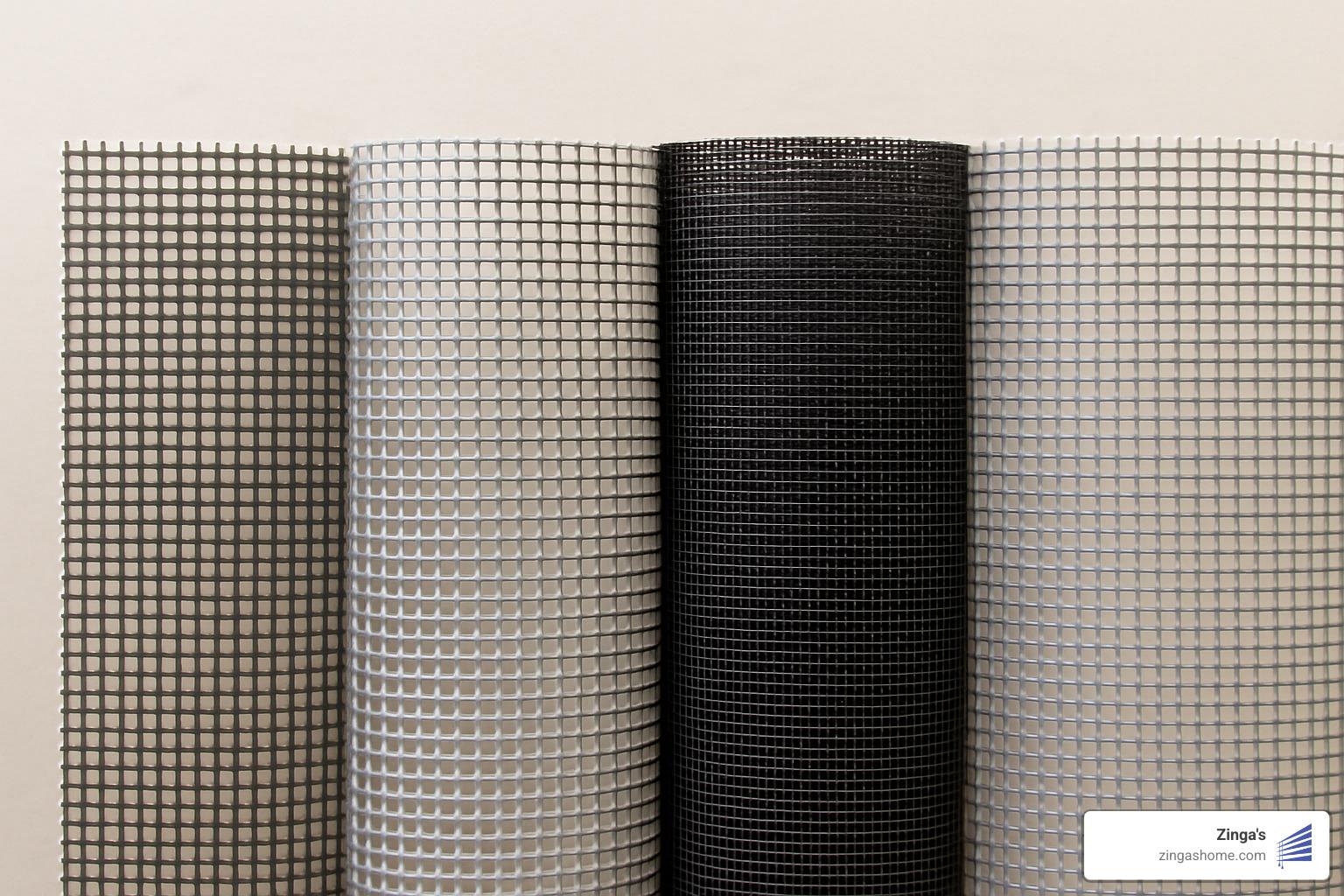
Mesh Matchmaking – screens for sliding patio doors
When it comes to selecting the perfect mesh for your patio door screen, the options might seem overwhelming at first. Let me guide you through the choices to help you find your perfect match.
Standard Fiberglass Mesh with its 18×16 weave (18 horizontal strands and 16 vertical strands per square inch) represents the sweet spot between functionality and affordability for most homeowners. This classic option provides good airflow and visibility while keeping common pests like mosquitoes and flies at bay. Available in charcoal or gray, I always recommend the charcoal finish to my clients because it significantly improves outward visibility compared to lighter colors.
For homes with four-legged family members, Pet-Resistant Mesh (15×10 weave) is worth every penny. As a pet owner myself, I've seen how regular screens don't stand a chance against excited dogs or curious cats. This specialized mesh is up to seven times stronger than standard fiberglass, resistant to tears and punctures from even the most enthusiastic pets. One of our customers in Tampa shared her experience: "After replacing three standard screens in two years due to our enthusiastic Labrador, we switched to pet-resistant mesh. It's been perfect—still looks new after three summers."
Living in Florida means dealing with those tiny biting insects that seem to find their way through standard screens. For these pesky no-see-ums and midges, you'll want No-See-Um Mesh with its tighter 20×20 weave. This specialized screen blocks even the tiniest insects while maintaining reasonable visibility and airflow – a must-have for coastal and marshy areas throughout the Southeast.
If your patio door faces south or west, consider Solar/Sun Control Mesh (20×30 weave). This multitasker not only keeps bugs out but also blocks up to 65% of UV rays, reducing heat gain and providing daytime privacy. Many of our clients are surprised by how much cooler their homes feel after installing solar mesh, with some reporting noticeable reductions in their summer cooling costs.
For those who prioritize crystal-clear views of their gardens or water features, BetterVue Improved Visibility Mesh delivers remarkable clarity. With 10% more light transmission and 15% better airflow than standard mesh while providing 33% better insect protection, its specialized coating makes the screen nearly invisible from inside your home. The difference is striking – it's like upgrading from standard to high-definition when looking out at your backyard.
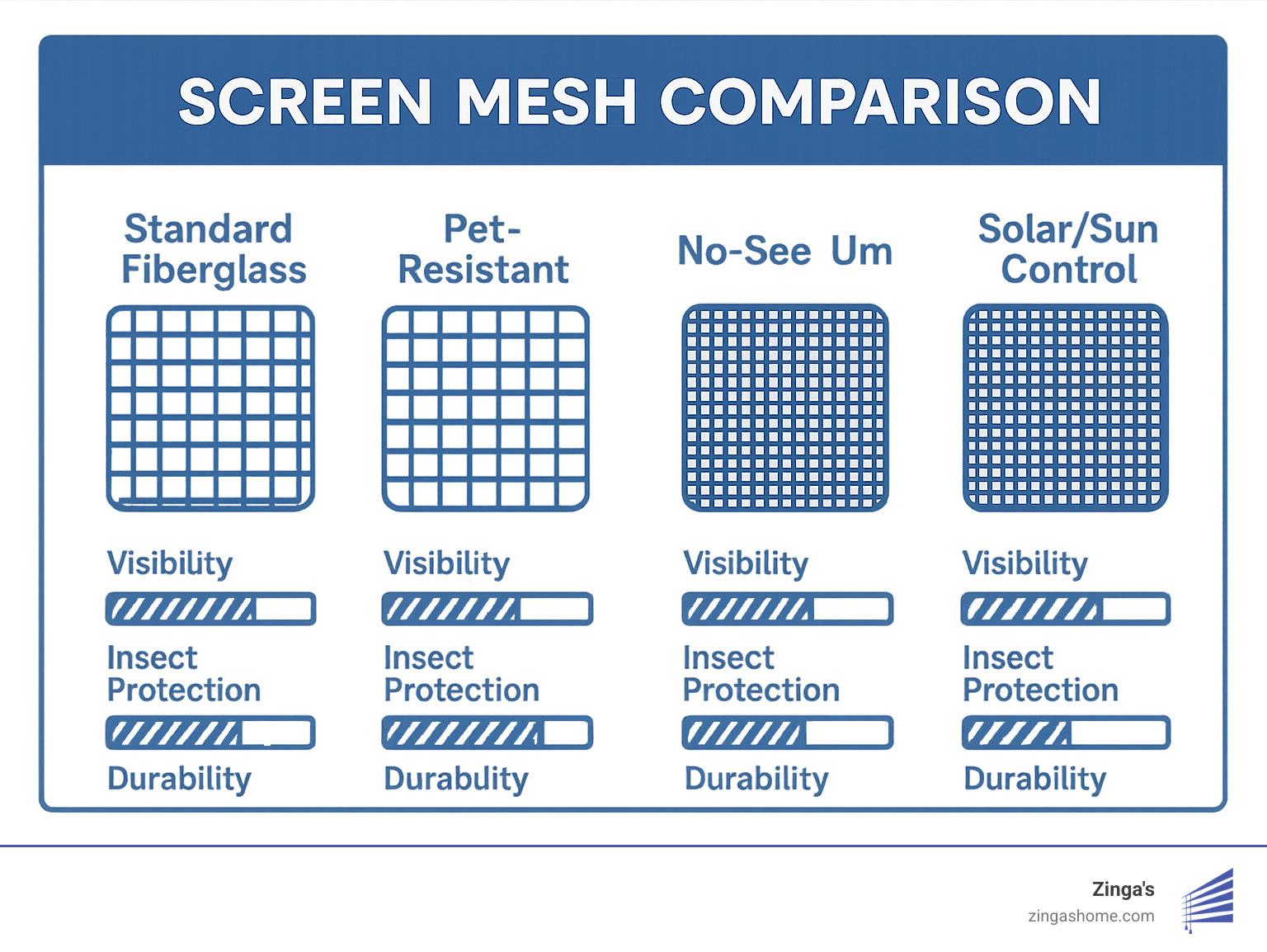
Frame Fundamentals
While mesh gets most of the attention, the frame of your sliding patio door screen deserves careful consideration too. It's the backbone that ensures smooth operation, longevity, and aesthetic appeal.
When comparing frame materials, you'll likely encounter both extruded and roll-formed aluminum. The difference matters more than you might think. Extruded aluminum frames are created by pushing aluminum through a shaped die, resulting in uniform thickness and superior strength throughout. Roll-formed frames, made by bending thin aluminum sheets into shape, are lighter and less expensive but sacrifice durability. In my years of experience at Zinga's, I've found that the modest upfront investment in extruded aluminum frames pays dividends in longevity and customer satisfaction.
Your screen frame should complement your door and home exterior. Most frames come in standard colors like white, bronze, tan, and black to match common door frames. For those seeking a perfect match to existing elements, some manufacturers offer custom color matching for an additional fee. I always recommend powder-coated finishes over painted surfaces, especially here in Florida where our intense UV exposure and high humidity can quickly degrade lesser finishes.
Living near the coast presents special challenges for any exterior product. For homes within a few miles of saltwater, look for frames with marine-grade finishes and stainless steel hardware to prevent corrosion. As a Florida-based company, we at Zinga's understand these challenges intimately. One of our Sarasota customers shared: "After replacing three standard screen doors in five years due to corrosion, we invested in a marine-grade system from Zinga's. Four years later, it still operates like new despite being just 200 yards from the Gulf."
Don't overlook the importance of quality rollers when selecting your screen door. These small components largely determine how smoothly your door operates over time. Nylon-coated steel wheels with ball bearings offer the smoothest, quietest operation. Some premium screens feature "Whisper Wheel Technology" with steel ball bearings specifically designed to maintain their smooth, quiet operation for years without degradation. It's a small detail that makes a big difference in your daily experience.
At Zinga's, we believe the perfect screens for sliding patio doors balance practical function with aesthetic appeal, creating that seamless transition between your indoor comfort and the natural beauty outside. With the right materials and proper installation, your patio screen door becomes not just a functional necessity but an improvement to your everyday living.
Measure, Fit & Install Like a Pro
Getting the perfect fit for your screens for sliding patio doors isn't just about buying quality—it's about precision from the very beginning. A beautiful screen that's measured incorrectly is like buying designer shoes in the wrong size—uncomfortable and ultimately disappointing.
Step-by-Step DIY Overview
If you're rolling up your sleeves for a weekend project, installing your own patio screen door can be surprisingly satisfying. I've helped hundreds of homeowners through this process, and with the right approach, you'll be enjoying bug-free breezes by dinnertime.
Before you start, gather these essential tools:
- Heavy-duty tape measure (not that flimsy one in your junk drawer!)
- Power drill with bits appropriate for your door frame material
- Both Phillips and flathead screwdrivers
- Level (for perfect alignment)
- Utility knife (for any minor adjustments)
- Rubber mallet (gentler than a hammer for those small persuasions)
When it comes to measuring, accuracy is everything. I recommend taking measurements in multiple spots since door frames aren't always perfectly square (especially in older homes). Use the smallest measurements to ensure your screen will fit without catching.
Frame-to-Frame Method works well for most installations—simply measure the width from inside one side frame to the inside of the other. Then measure the height from the top of the bottom track to the underside of the top frame.
For a more precise fit, try the Track-to-Channel Plus ¼" approach. Measure from the top of the bottom track to the edge of the top channel, then add that critical ¼" for proper fit. This little buffer makes all the difference between a screen that glides smoothly and one that sticks and frustrates.
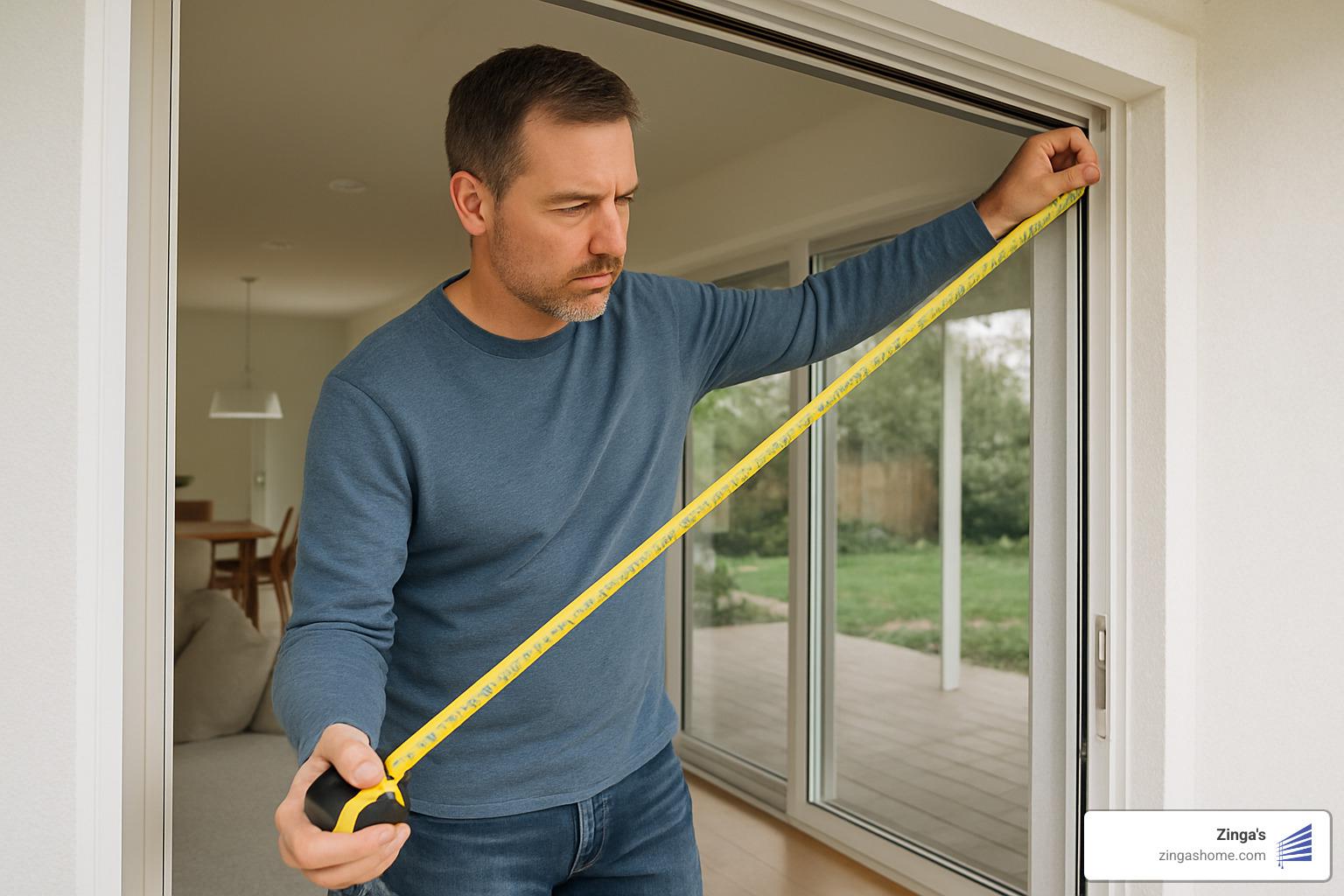
When it's time for installation, start by carefully unpacking your screen door and checking all components. For traditional sliding screens, the process flows naturally: insert the top of the frame into the upper track, compress those bottom rollers slightly, and position the door into the lower track. The magic happens when you adjust those rollers using the screws at the bottom of the door frame—this is what gives you that smooth glide and even clearance all around.
I recently helped Sarah in Tampa with her installation over FaceTime. She told me afterward, "I was so nervous about doing this myself, but those quick-snap tracks made it surprisingly easy. The whole process took less than an hour, and now I can enjoy my morning coffee on the patio without sharing it with mosquitoes!"
For retractable screens, the process is a bit different but equally manageable. You'll mount the cassette housing to the door frame first, then install the side tracks with the provided screws. The key is testing that retraction mechanism thoroughly and making small adjustments to the tension until it operates just right.
When to Call the Experts
While I'm always impressed by DIY enthusiasm, there are times when calling in professionals like our team at Zinga's makes more sense. It's like changing your own oil versus rebuilding a transmission—know your limits!
Complex openings present unique challenges. If your patio door has unusual dimensions, architectural quirks, or custom features, professional measurement and installation ensure proper fit and function. I've seen too many homeowners struggle with oddly-shaped door frames only to end up with gaps or binding screens.
Motorized systems definitely warrant professional installation. These sophisticated screens require proper electrical connections and precise calibration. Our technicians are trained to integrate these systems with your home automation and ensure everything works seamlessly. The peace of mind alone is worth it.
Warranty protection is another compelling reason to go pro. Many premium screen manufacturers will only honor warranties on professionally installed products. This protection can save you considerably if issues arise down the road.
Then there's the matter of time and convenience. What might take you a weekend of trial and error (and possibly a few trips to the hardware store) our experienced technicians can complete in 1-2 hours. We arrive with everything needed and handle the entire process with minimal disruption to your home.
I remember helping the Johnsons in Naples who had spent three frustrating weekends trying to install a complex corner screen system. After our team completed the job in just under two hours, Mrs. Johnson said, "I wish we'd called you first—you saved us so much stress and the screens look amazing!"
At Zinga's, we offer free in-home consultations because seeing your space in person helps us recommend the perfect solution. Our design consultants don't just measure—they listen to understand how you use your space and what matters most to you.
Whether you choose the DIY route or prefer our white-glove service, the goal is the same: a beautifully functioning screen door that improves your home and lifestyle, letting the outside in—but only the parts you want!
Care, Repairs & Longevity Tips
Proper maintenance of your screens for sliding patio doors will significantly extend their lifespan and keep them operating smoothly for years to come.
Common Troubles & Fixes
Sticking or Difficult Operation
- Cause: Debris in tracks, misaligned frame, or damaged rollers
- Fix: Clean tracks thoroughly with a vacuum and damp cloth. Apply silicone spray lubricant (not WD-40, which attracts dirt). For damaged rollers, replacement kits are available at hardware stores for $10-15.
Torn or Damaged Mesh
- Cause: Impacts, pets, or age-related deterioration
- Fix: Small tears can be repaired with screen patch kits. For larger damage, the mesh can be replaced without replacing the entire door. For standard doors, rescreening kits cost $25-35 and include the necessary tools.
Sagging Frame
- Cause: Impact damage or structural weakening over time
- Fix: Minor sagging can sometimes be corrected by adjusting the rollers. Significant frame damage usually requires replacement, though aluminum frames can occasionally be reshaped by professionals.
Loose or Broken Latch
- Cause: Wear and tear, misalignment, or impact damage
- Fix: Most latches are secured with standard screws and can be tightened or replaced easily. Replacement latches typically cost $5-15 depending on style and quality.
One Dallas homeowner shared this experience: "Our screen door was sticking terribly. I was about to replace it when a Zinga's technician showed me how to clean the tracks properly and adjust the rollers. It now slides like new, and the service call saved us hundreds compared to replacement."
Maintenance Schedule
Implementing a regular maintenance routine will keep your sliding patio door screen functioning optimally:
Monthly Tasks
- Vacuum tracks to remove debris
- Wipe down frame with a damp cloth
- Check for developing tears or damage in mesh
Quarterly Tasks
- Wash mesh with mild soap and water using a soft brush
- Rinse thoroughly and allow to dry completely
- Inspect and tighten any loose screws
- Check roller operation and adjust if needed
Annual Tasks
- Apply silicone lubricant to tracks and rollers
- Inspect weatherstripping and replace if worn
- Check frame alignment and adjust as needed
- Examine mesh for UV damage or stretching
Off-Season Care for Retractables
For retractable screens in seasonal homes or severe winter climates:
- Retract the screen fully when not in use for extended periods
- Consider a protective cover for exposed cassette housings
- Ensure the screen is clean and dry before long-term storage
"I've had the same sliding screen door for over 12 years," reports a Vero Beach customer. "The secret is keeping the tracks clean and lubricating the rollers twice a year. It still glides as smoothly as the day it was installed."
Cost, Warranty & How to Buy Screens for Sliding Patio Doors
When it comes to investing in screens for sliding patio doors, understanding the costs and options helps you make a choice that fits both your needs and budget. Like most home improvements, sliding door screens come in a wide range of price points reflecting their quality, features, and durability.
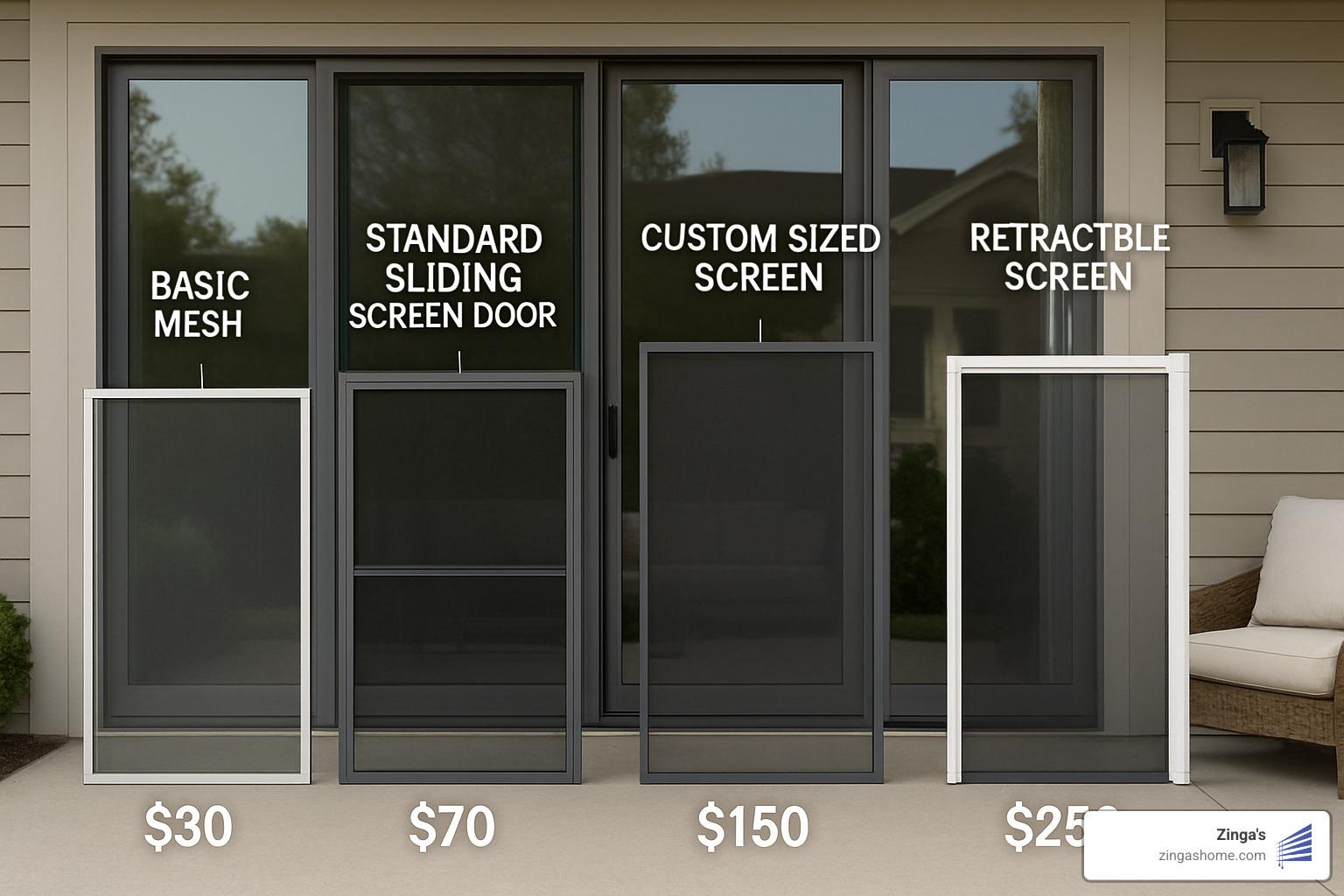
If you're budget-conscious, basic DIY replacement mesh kits start around $20-$50, perfect for refreshing an existing frame. Moving up the quality ladder, standard sliding screen doors typically range from $80-$150 for common sizes, while custom-sized traditional screens generally cost between $150-$300 depending on your door's specific dimensions and your chosen materials.
For those seeking more sophisticated solutions, retractable screens offer convenience at $200-$500 for manual systems. At the premium end, motorized or oversized screens range from $500 to $2,500+, reflecting their advanced technology and custom manufacturing.
Several factors naturally influence what you'll pay. Size matters – larger doors require more materials and often custom manufacturing. Material quality plays a big role too, with premium meshes and heavy-duty frames costing more but offering significantly better durability. Special features like retractable mechanisms, motorization, and smart-home integration add convenience but also increase your investment. And don't forget about installation – professional installation typically adds $100-$300 depending on complexity, though it ensures everything works perfectly from day one.
As one of our Indianapolis customers wisely shared: "Read the warranty details carefully. I chose a mid-priced option with a strong warranty rather than the cheapest screen, and when a roller failed after 18 months, the entire mechanism was replaced at no cost."
Speaking of warranties, they vary significantly among products. Limited lifetime warranties typically cover the frame and mechanical components but exclude the mesh itself (which is considered a "wear item"). Budget options often come with 90-day warranties that only cover manufacturing defects. Pay attention to labor warranties as well – at Zinga's, we stand behind our work with a 1-year installation guarantee. And don't forget those registration requirements – many extended warranties need to be activated within 30-90 days of purchase.
Comparing Quotes & Suppliers
When shopping for screens for sliding patio doors, you'll find several types of suppliers, each offering different advantages.
Online retailers and kits typically offer the lowest prices and convenient shopping from home. They're perfect for budget-conscious DIYers with standard-sized doors, though you'll handle your own measurements and installation, and shipping damage is always a possibility.
Local screen shops offer the benefits of custom sizing and face-to-face consultation. While prices might be higher than online options, you're supporting local business and often get quicker turnaround. These are ideal when you need something specifically sized for your home.
Big-box home improvement stores provide immediate availability and easy returns. Their adjustable options work well for standard needs, though they typically limit sizes (usually up to 80" height) and offer fewer premium choices. They're perfect when you need something right away.
Specialty screen companies like Zinga's deliver expert consultation, professional measurement, and installation along with premium products. While the initial investment is higher, the worry-free experience and superior results often justify the cost for many homeowners.
A Nashville customer shared their experience: "After getting quotes from three different suppliers, we chose Zinga's despite not being the lowest price. Their design consultant identified issues with our door frame that others missed, and their solution has been flawless. The value far exceeded the price difference."
Understanding the Fine Print
Before finalizing your purchase, take time to understand what you're really getting. Most warranties exclude the mesh itself from long-term coverage, considering it similar to windshield wipers on a car – an item that naturally wears over time.
If professional installation is included, confirm whether future adjustments or service calls are covered and for how long. This can make a significant difference in long-term satisfaction.
Pay attention to accidental damage clauses – warranties typically distinguish between manufacturing defects (covered) and accidental damage (not covered). Understanding where this line is drawn prevents future disappointment.
Don't miss those registration deadlines – many extended warranties require product registration within a specific timeframe after purchase, often 30-90 days. Mark your calendar so you don't forfeit valuable protection.
If you might sell your home in the future, check whether the warranty is transferable to new owners. This can become an attractive selling point when marketing your home.
One of our Fort Myers customers offered this practical advice: "Get everything in writing, including promised features and installation details. Our detailed quote from Zinga's specified exactly what mesh we were getting and the hardware finish, which prevented any confusion later."
At Zinga's, we believe in complete transparency about what you're purchasing. Our commitment to honesty and integrity means we'll walk you through every aspect of your investment in screens for sliding patio doors, helping you understand exactly what you're getting and what to expect in terms of performance, maintenance, and warranty coverage.
Frequently Asked Questions about Sliding Patio Door Screens
How do retractable screens handle wind?
Wind can be a real challenge for screens for sliding patio doors, especially retractable models. While standard retractable screens perform beautifully during calm days, they can struggle when the breeze picks up.
Quality retractable screens come with features designed specifically for wind resistance. Many premium models include deeper side tracks that grip the mesh more securely, weighted bottom bars that maintain tension even in gusty conditions, and some even feature smart technology with wind sensors that automatically retract the screen when conditions get too blustery.
A West Palm Beach homeowner shared her experience with us: "Living right on the coast means we deal with afternoon sea breezes almost daily. Our first retractable screen would blow out of the tracks regularly, which was frustrating. After consulting with Zinga's, we switched to a traditional sliding screen with a heavy-duty frame for everyday use, saving the retractable for special occasions when the weather cooperates."
If your heart is set on retractable screens but you live in a windy area, look for models specifically engineered with reinforced edges and deeper tracks. The right design can make all the difference between constant readjustment and trouble-free enjoyment.
What mesh is best for homes with pets or kids?
When you have four-legged friends or little ones running around, durability becomes just as important as function when selecting screens for sliding patio doors. Standard mesh simply wasn't designed to withstand enthusiastic paws or curious fingers.
Pet-resistant mesh has become a game-changer for animal lovers. Made from vinyl-coated polyester, it's approximately seven times stronger than standard fiberglass, standing up to scratching claws while maintaining visibility and airflow. For homes with particularly energetic pets, TuffScreen Heavy Duty Mesh offers exceptional durability without compromising on your view.
"Our two German Shepherds inspect every inch of our screen door daily," laughed Sarah from Sarasota. "After replacing standard screens twice in one year, we invested in pet-resistant mesh from Zinga's. Three years later, despite countless nose prints and occasional paw scratches, it still looks great. That extra $50 for upgraded mesh has saved us hundreds in replacements."
For families with young children, consider safety features beyond just durable mesh. Magnetic latches that automatically close the door prevent little ones from accidentally leaving it open, while higher-positioned handles keep toddlers from opening the door unsupervised. If you choose retractable screens, look for models with visual indicators that make the nearly-invisible mesh more noticeable, preventing accidental walk-throughs.
Some homeowners take a different approach altogether, installing a decorative pet gate a few inches in front of their screen door. This creates a buffer zone that protects the screen while still allowing airflow.
Can screens improve my door's energy efficiency?
While most homeowners think of screens for sliding patio doors primarily as bug barriers, they can actually play a surprising role in your home's energy efficiency and comfort.
Solar/sun control mesh can block up to 65% of UV rays while still maintaining visibility. This significant reduction in solar heat gain can translate to real savings on summer cooling costs, especially for doors that face south or west and receive direct afternoon sun. The mesh essentially creates a first line of defense against heat before it hits your glass doors.
The ventilation benefits shouldn't be overlooked either. By keeping insects out while letting fresh air in, screens allow you to take advantage of natural cooling during mild weather instead of running your air conditioning. Strategic cross-ventilation through screened openings can create pleasant airflow throughout your home.
A Texas customer shared his experience: "After installing solar mesh screens on our western patio doors, the temperature difference was immediately noticeable. Our living room stayed significantly cooler during the afternoon sun, and our summer electric bills dropped by about $30 per month. The screens paid for themselves in the first season."
It's worth noting that standard screens provide minimal insulation benefit during colder months. Some homeowners choose to install solar screens during summer and remove them in winter when solar heat gain becomes beneficial rather than problematic. For year-round energy management, consider pairing your screens with proper weatherstripping on the main doors.
At Zinga's, we can help you balance energy efficiency with visibility and airflow, creating a customized solution that works for your specific home orientation and climate needs. Our in-home consultations consider factors like sun exposure, prevailing winds, and your lifestyle to recommend the perfect screen solution.
More info about our patio screen services
Conclusion
Selecting the perfect screens for sliding patio doors is more than just a practical decision—it's an investment in your home's comfort, functionality, and the way you experience indoor-outdoor living. Whether you've chosen traditional sliding panels, neat retractable screens, or sophisticated motorized systems, your new screen will transform how you interact with your outdoor spaces.
At Zinga's, we believe that the right screen solution should blend seamlessly with your lifestyle and home design. That's why we take a personalized approach with every customer. Our expert in-home design consultations allow us to understand your specific needs, preferences, and challenges before recommending the perfect solution for your unique situation.
What truly sets us apart is our holistic approach to indoor-outdoor living. Unlike companies that focus solely on screens, we consider how your patio door screens integrate with your entire home environment—from interior window treatments to outdoor shade solutions. This comprehensive perspective ensures a cohesive, beautiful living space that flows naturally from inside to outside.
"We wanted to enjoy our patio more but were constantly battling bugs and glare," shares Jennifer, a recent Zinga's customer from Naples. "Our design consultant suggested a combination of solar mesh screens for our sliding doors and coordinating outdoor shades for our pergola. The difference is remarkable—we're using our outdoor space almost daily now, and our cooling bills have actually decreased!"
Our professional installation team ensures your new screens for sliding patio doors function flawlessly from day one, with most installations completed in a single visit. And because we stand behind our work, you can rest assured that we'll be there if you need any adjustments or have questions down the road.
Whether you're looking to replace an aging screen door, upgrade to a retractable system, or create a fully screened outdoor living space, we bring expertise, quality products, and genuine care to every project. We're proud to serve homeowners throughout Florida, Texas, Tennessee, and Indiana with the same dedication to excellence that has built our reputation over the past decade.
Transform your home's connection to the outdoors with screens for sliding patio doors that perfectly balance functionality, durability, and style. The right screen solution doesn't just keep bugs out—it invites fresh air in, protects your family from UV rays, and improves your overall living experience. It's an investment in comfort that pays dividends every time you open your door to enjoy the breeze without unwelcome visitors.
Ready to experience the difference that expert guidance and quality installation can make? Contact Zinga's today for your free in-home consultation and take the first step toward seamless indoor-outdoor living.
